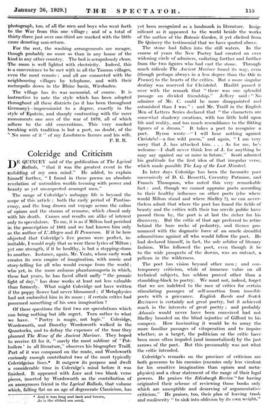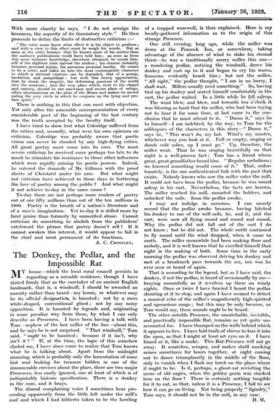Coleridge and Criticism
DE QUINCEY said of the publication of The Lyrical Ballads, `.` that it was the greatest event in the =folding of my own . mind." He added, to explain himself further, " I found in these poems an absolute revelation of untrodden worlds teeming with power and beauty as yet unsuspected amongst men."
The range of Coleridge's unhappy life is beyond the scope of this -article ; both the "early period of Pantiso crasy, and the long drawn out voyage across the calms of opium and the storms of remorse, which closed only with his death. Causes and results are alike of interest only to speculators. To me, it is as if Milton had perished in the proscription of 1661 and we had known him only as. the author of L'Allegro and Il Penseroso. If it be here objected. that Coleridge's five poems were perfect, in- imitable, I would reply that so were these lyrics of Milton ; yet one strength, if it be healthy, is but a stepping-stone to another. Instance, again, Mr. Yeats, whose early work creates its own empire of imagination, with music and story-telling for all who would escape from the world ; who yet, in the more arduous phantasmagoria in which, these last years, he has faced albeit sadly " the prosaic light of day," has done works at least not less valuable than formerly. What might Coleridge not have written if the poppy flower had never blossomed ; if Metaphysics had not embroiled him in its maze ; if certain critics had possessed something of his own imagination ?
Of these questions the first two are speculations which can bring nothing but idle regret. Turn rather to what we have. " Poetry is magic, not logic." Coleridge, Wordsworth, and Dorothy Wordsworth walked in the Quantocks, and to defray the expenses of the tour they planned The Rime of the Ancient Mariner. They hoped to, receive £5 for it, " surely the most sublime of ' Pot- boilexs ' in all literature," observes his biographer Trail. Part of it was composed on the route, and Wordsworth curiously enough contributed two of the most typically Coleridgeian lines.* It outgrew its purpose and dwelt a considerable time in Coleridge's mind before it was finished. It appeared. with Love and two blank verse Pieces, inserted by Wordsworth as the. contribution, of an anonymous friend in the Lyrical Ballads, that volume which, falling flat on an, age of degenerate Classicism, has
* And it 'was long and lank and brown, As is the ribbed sea sand,
-yet been recognized as a landmark in - literature. Insig- nificant as it appeared to the world beside the works of-the author of the Botanic- Garden, it yet elicited from 'De Quincey the testimonial that we have quoted above.
The stone had fallen into the still waters. In the course of years the New Poetry had created- an ever widening circle of admirers, radiating further and further from the two figures who had cast the stone. Through much ridicule The Ancient Mariner found its way, even (though perhaps always in a less degree than the Ode to France) to the hearts of the critics. But a more singular destiny was reserved for Christabel. - Hazlitt passed -it over with the remark that " there was -one splendid Passage on divided friendship." Jeffery said : " No admirer of Mr. C. could be more disappointed and astonished than I was " : and Mr. Traill in the English Men of Letters Series declared that " the characters are somewhat shadowy creations, with too little hold upon life and reality, and too much resemblance to the flitting figures of a dream." It takes a poet to recognize a poet. Byron wrote—" I will hear nothing against Christabel—a fine wild poem," and again, " I am very sorry that J. has attacked him. . . . As for me, he's welcome—I shall never think less of J. for anything he may say against me or mine in future." Scott admired his gratitude for the first idea of that irregular verse, which made possible The Lay of the Last Minstrel.
In later days Coleridge has been the favourite poet successively of D. G. Rossetti, Coventry Patmore, and Francis Thompson, who noted this very remarkable fact : and, though we cannot appraise poets according to their healthy influence on other poets (else where would Milton stand and where Shelley ?), we can- never- theless admit that where the poet has found the fields of beauty and the critics with their too servile public have passed them by, the poet is at last the richer for his discovery. But the critic of. that age preferred to retire behind the bare rocks of pedantry, and thence pro- nounced with the dogmatic force of an oracle dreadful admonitions against all who would follow the poet. He had .declared himself, in fact, the sole arbiter of literary fashion. Who followed the poet, even though it be to the wide prospects of the downs, was an outcast, a pelican in the wilderness.
The poet has vision beyond other men ; and con- temporary criticism, while of immense value. on all technical subjects, has seldom proved other than a stumbling-block to poetry. We must not, indeed, forget that we are indebted to the race of critics for certain stimulating passages of self-assertion from irascible poets with a grievance. English Bards and Scotch Reviewers is certainly not great poetry, but it achieved much in the interests of great poetry ; and probably Adonais would never have been conceived had not Shelley brooded on the blind injustice of Gifford to his compeer. How fascinating it would be to array the more familiar passages of vituperation and to inquire whether, as .a target, the politician or the critic have been more often impaled (and immortalized) by the just arrows of :the poet. But this presumably was not .what the critic intended.
Coleridge's remarks on the . province of criticism are both generous to his enemies (enemies only less -virulent for his sensitive imagination than opium and meta- physics) and a clear statement of the range of their legal powers. He praises the Edinburgh Review " for having originated their scheme of reviewing those books only which ,are susceptible and deserving of argumentative criticism." He praises, too, their plan of leaving trash and mediocrity to sink into oblivion by its own weight." With more charity . he says, " I do not arraign the keenness; the asperity of its damnatory style.'-' He then proceeds to define the limits of destructive criticism :-.7-, "The critic must know what effect it is his object to produce; and a view to this effect must he weigh his words. _But as soon as the critic betrays that he knows more of his author than the author's publications could have told him • as soon as from this more intimate knowledge, elsewhere obtained, he avails him- self of the slightest trait against the author ; his censure instantly becomes personal injury, his sarcasms personal insults. lie ceases to be a critic, and takes tan him the most contemptible character to which a rational creature can be degraded, that of a gossip, and pasqui t : but with this heavy aggravation, Hall backbiter, that he steals the unqui t, the deforming passions of the world into the museum ; into e very place which, next to the chapel and oratory, should be our sanctuary and secure place of refuge, offers abominations on t)ie altar of the Muses and makes its sacred paling the very circle is which he conjures up the lying and pro- fane spirit."
There is nothing in this that can meet with objection. Yet only after the miserable misrepresentation of every eonsiderable poet Of the beginning of the last century was the truth accepted by the faculty itself.
I have tried to show first what Coleridge suffered from .. the critics and, secondly, whit were his own opinions on criticism._ Coleridge was probably aware that poetic vision. can never be clouded by any high-flying critics. All great piietiy must come into its own. The most severe criticism he received came perhaps too late to do much to stimulate his resistance to those other-influences which were rapidly *ruining his poetic. powers. Indeed, he entered the domicile of Mr. Gillman with the proof sheets of • Christabel under his arm. But what might not criticism have achieved in those days in furthering the love of poetry among .the public ? And what might it not achieve to-day in the same cause ?
To-day there are not perhaps more readers of poetry out of our fifty millions than out of the ten millions- in 1800. Poetry is the breath of a nation's literature and Of a race's imagination. Yet to-day it is stifled more by faint praise than formerly by unmerited abuse. • Cannot criticism do something to abolish from the publishers' catchword the phrase that poetry doesn't sell ? If it cannot awaken this interest, it would appear to fail in the chief--and most permanent - of its functions.
A. C. CROSSLEY.,









































 Previous page
Previous page